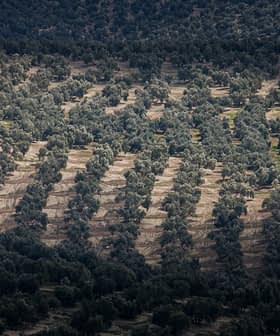 A farmer’s group has called for sanctions against alleged abusive practices in the highly concentrated distribution channel of Spain’s olive oil industry.
A farmer’s group has called for sanctions against alleged abusive practices in the highly concentrated distribution channel of Spain’s olive oil industry.
The UPA, a professional body for small-scale farmers, claims that a form of “commercial terrorism” is taking place. Ignacio Senovilla, the UPA’s agriculture secretary, says that among the unfair practices are the continued below cost retail sales of olive oil, the holding of so-called blind auctions, and the general abuse of the dominant position held by distributors.
The UPA wants Spain’s “ambiguous” retail trading and competition laws changed to ensure the practices are prosecuted and punished, and the implementation of a code of conduct to govern olive oil sales. “The implementation of these measures will help establish fair play rules for everyone, ensuring the future, strength and stability of the sector,” Senovilla said.
 In addition, the UPA has called for resources to help increase the level of concentration on the supply side and seek new olive oil markets. It says producer protests are imminent if the measures are not pursued at the relevant regional, central and European government levels.
In addition, the UPA has called for resources to help increase the level of concentration on the supply side and seek new olive oil markets. It says producer protests are imminent if the measures are not pursued at the relevant regional, central and European government levels.
“As for the internal market, it is absolutely essential and urgent to properly value our olive oil, which is a very difficult task given the distributors’ sales policies allow it to be used as a loss leader product which is constantly ‘on special offer’,” Senovilla said.
The UPA recently held a press conference to complain that a deal at supermarket giant Lidl effectively saw EVOO sold at €1.57 per liter. At no time since January 2010 had producers’ prices even been that low, not even for lampante oil, let alone allowing for the cost of packaging and transport, the farmers complained.
Senovilla renewed calls for the European Commission to update the “totally obsolete” thresholds for activating private storage measures as an interim measure to prop up prices.

In January, Agriculture Commissioner Dacian Cioloş agreed to provide private storage aid for the struggling EU pigmeat sector but he has so far rejected calls to do so for olive oil.
Cioloş said last week that the bargaining clout of large-scale distributors was at the root of Spain’s olive oil pricing problems — not a market disturbance.
Also last week, EC sources said that not only were olive oil prices in Spain above the threshold, they had improved in the third week of February.
According to the EC, the price of EVOO rose 1.5 percent (with respect to the previous week), to €210.35 ($290.32) per 100kg, virgin olive oil was up 1.7 percent, to €199.38 ($275.18), and lampante 1.8%, to €186.31 ($257.14).
In Greece, the prices for EVOO and lampante oil are currently low enough to qualify for the private storage measures, the sources said. Cioloş says that for now he will continue to monitor the market.
Meanwhile, Spain’s 2010-11 olive oil production is already up 24 percent on last year’s total, and the season isn’t quite over. According to Spain’s AAO (Olive Oil Agency), a total of 1.07 million tons had been produced by the end of January. It said the above-average harvest had been aided by favorable weather.








